-

新人教版高中英语必修3Unit 5 The Value of Money- Discovering Useful Structure教学设计
Step 3 Meaning1. 过去将来时表示从过去某一时间来看将要发生的动作或存在的状态, 常用在宾语从句中。一般由“would/should +动词原形”构成。She hoped that they would meet again someday. 她希望将来有一天他们能再见面。2. was/were going to+动词原形: 表示过去将要发生或很有可能发生的动作, 常用于口语中, 表示预言、意图或者打算等。He was going to start work the following week. 他打算下星期开始工作。3. was/were about to do: 常用来表示即将发生的动作, “刚要/正要做……”。注意该结构不与任何时间状语连用。I felt that something terrible was about to happen. 我感到某种可怕的事情即将发生。4.was/were to do: 表示“曾计划做某事”, 如果表示“本来计划做某事, 动作没实现”, 则需用 “was/were to have done”。She said she was to have told me about the accident. 她说她本来想告诉我关于事故的事。5.Start, go, come, leave, see, meet等动词的过去进行时: 表示就过去某一时刻而言即将发生的动作。She was coming later. 她随后就来。I had just put on my overcoat and was leaving to visit a friend of mine. 我刚穿上外套要去看我的一个朋友。

新人教版高中英语必修3Unit 5 The Value of Money-Listening &Speaking&Talking教学设计
4. A:We’d like to have someone to say a word at the beginning to welcome the group.B:↙Who?A:We thought that you or Dr.Johnson might do it.B用降调说Who,其意思是问,对方想让谁在开场时致欢迎词。Step 6 Pronunciation---Practice1. Listen to the short conversation and mark the intonation with ↗, ↙ or ↙, ↗. Then discuss with a partner what they intend to convey by using different intonation.Owner: You know what ?↗ It’s a million-pound bank note↙.Waiter 1: Really ?↗(question)Waiter 2: Really !↙(unbelievable and surprised)Waiter 3: Really ?!↙↗(first question then surprised)2. Listen to the conversations. Underline the parts that are stressed and mark the intonation. Then talk about the implied meanings of the responses with different intonations. Listen again and repeat.1) Henry: It’s a nice suit.Owner: Oh, it’s perfect!↙(The intonation means it is very suitable for Henry.)2) Henry: Well, that’s very kind of you.Owner: Kind, sir ?↗(what you said is not right) No, it’s kind of you. You must come whenever you want and have whatever you like. Just having you sit here is a great honour !!↙(welcome you to come again)3)Henry:Well, to be honest, I have none. Oliver:(happily) What luck!(excited) Brother↗, what luck!↙(It means “Didn’t you hear it?”)Henry: Well, it may seem lucky to you but not to me!↗(angry) If this is your idea of some kind of joke, I don’t think it’s very funny. Now if you’ll excuse me, I ought to be on my way.↙(If so, I would leave.)Roderick: Please don’t go↙...(hope Henry can wait for a moment)Part B Viewing and Talking---Describe people’s changing attitudes in a film clipStep 1 Before-listening---Tell the filmYou are going to watch part of the film The Million Pound Bank Note. Look at these photos and guess what happens in the film.

新人教版高中英语必修3Unit 5 The Value of Money-Listening &Speaking教学设计
Step 4: Listen again and decide if the following statements are true (T) or false (F).1 It was the first time Chen Liyan's story was reported. T口 F口2 Chen found 10,000 yuan in a small plastic bag in Taiyuan railway station口 F口3 Wang Zheng apologized to Chen because he couldn't offer her more money. T口 F口4 Chen took out a large loan to cure her daughter, T口 F口5 Wang set up a fundraising website for Chen's daughter after Chen told him about her situation. T口 F口Step 5:After listening, discuss the questions.1 What kind of person do you think Chen Liyan is?Chen Liyan is generous and honest because she returned a large sum of money to the owner.2 Did Chen return the money because she didn't need it?No. She returned the money because it was the right thing to do. Evidence for this is that she refused to accept the reward money because she felt that it had not been earned. 3 Is it common for people to do what Chen did?It depends on the culture. In some countries it is quite common to return money that has been found. In other countries, people believe "Finders are keepers!" 4 How did Wang Zheng feel about the return of his money?He must have been very happy and relieved to have gotten his money back. We know this because he thanked Chen repeatedly and even offered her a reward.5 Why did Ma Dongbao tell Wang about Chen's family?He must have had great sympathy for Chen and her daughter and wanted to help them.'We know this because he arranged help for them. 6 How did the news reporter feel about Chen's actions?The news reporter felt that it showed that money wasn't the most important thing in life. We know this because the reporter told us that this is what Chen believes. and then said, “that's a great attitude to take."

新人教版高中英语必修3Unit 5 The value of money-Reading and Thinking教学设计二
? Could you offer me some kind of work here?? I don’t want your charity, I just want an honest job.? Careless: I landed in Britain by accident.Step 7:Consolidation.? Find Henry? Roderick and Oliver were I .making a bet when they saw Henry, a poor young man. ? Know Henry? About a month ago, Henry was sailing and later he found himself carried out to sea by a strong wind. Fortunately, he 2.was spotted by a ship. And it was the ship that brought him to 3.England? Offer money to Henry ? Oliver and Roderick gave Henry a letter and told him that there was money in it. They 4.persuaded him to accept it, and made him 5.promise that it wouldn't be opened until 2 o'clock.Step 8:Language pointsa large amount of: a large quantity of; a great deal ofe.g. They bought a large amount of furniture before they moved their new house.make a bet: make an arrangement to risk money, etc. on an event of which the result is doubtful.e.g. We made a bet on the result of the match.permit sb to do something: allow somebody to do somethinge.g. My mother doesn’t permit me to ride in the street after it rained.by accident: as a result of chancee.g. I only found it by accident.stare at: look at somebody or something with the eyes wide open in a fixed gaze( in astonishment, wonder, fear, etc)to be honest: to tell you the truth; to be franke.g. To be honest, I don’t think we have a chance of winning.Step7 Homework:What do you think will happen to Henry? Will the bank-note help him or get him into trouble?

新人教版高中英语必修3Unit 5 The Value of Money-Reading and Thinking教学设计一
Everybody wants to get wealth.In today’s material world,making money or becoming wealthy symbolizes a person’s success and capability. Many people just make every effort, pay any price to attain greater wealth. With money,they can buy nice, large apartments in nice neighborhood. With money they can own luxurious cars. Wealth seems to bring all happiness in life.But is wealth the only road to happiness? Not really. There are many things in the world, which are beyond the means of money, such as friendship, love, health and knowledge. People are so preoccupied with struggling for money that they have no time or would not take the time to form or maintain friendship. What happiness can they feel living as lonely miserable creatures without love or friends in the world even if they accumulate tremendous wealth?In my opinion, people can’t do anything without money, but money is not everything. What money will bring you depends on your personal belief and goal in life. If you are kind enough to help others, especially the poor, money is a good thing to you. With it, you can do much more for the benefit of people and your country, and it will add to your own happiness. If you want money just for your own needs, you’ll never be satisfied or happy. In a word,you should have money spent for more people. Only then can money be the source of your happiness.Step 8 Homework4 students in a group, one acts Roderick, one Oliver, one servant and the fourth one acts Henry Adams, then listen to the tape, pay more attention to the difference between American English and British English in pronunciation, stress, tone.

新人教版高中英语必修3Unit 5 The Value of Money-Reading for Writing教学设计二
2. 您能看到, 我头发太长了。You can see that my hair is much too long.3. 无论什么时候, 只要您想回来就回来。Please come back whenever you want.4. 您仅有很少的头发要理! You only have too little hair to cut !5. 为您服务是我的荣幸!It is my honour to serve you!Step 9 Writing(Henry is walking down the street when he sees a sign for a place that cuts hair. He decides to have it cut. )H=Henry B=BarberH: Good afternoon, I’d like to have my hair cut, if I may. (The barber looks at Henry’s hair and continues cutting another man’s hair. ) Er, I’d really like a haircut. As you can see it’s much too long. B: (in a rude manner) Yes, I can see that. Indeed, I can. H: Fine, well, I’ll have a seat then. (He sits in one of the barber’s chairs. The barber turns to look at Henry. )B: It’s quite expensive here, you know! Are you sure you can afford it?H: Yes. I think so. (After his hair is cut, the barber tells Henry how much he must pay. Henry shows the barber the bank note. )B: Why Mr. . . (looks shocked)H: Adams. Henry Adams. I’m sorry. I don’t have any change. B: Please don’t worry! (wearing a big smile) Nothing to worry about! Nothing at all! Please come back whenever you want, even if you only have too little hair to cut! It will be my honour to serve you!Step 10 Pair workExchange drafts with a partner. Use this checklist to help your partner revise his/her draft.1. Are all the elements of a play included and in good order ?2. Do the character use suitable language ?3. Are the stage directions clear and useful ?4. Is the plot clear and exciting enough ?

新人教版高中英语必修3Unit 5 the value of money-Reading For Writing教学设计一
【参考范文】Narrator:(Henry is smiling as he leaves the restaurant. As he is walking down the street, he sees a sign for a place that cuts hair. He decides to get it cut. )H=Henry;B=Barber;R=rude manH:Good afternoon, I'd like to get a cut, if I may. (The barber looks at Henry's hair and continues cutting another man's hair. )Er, I'd really like a haircut. As you can see it's much too long. B:(in a rude manner) Yes, I can see that. Indeed, I can. H:Fine, well I'll have a seat then. (He sits in one of the barber's chairs. The barber turns to look at Henry. )B:It's quite expensive here, you know!Are you sure you can afford it?H:Yes. I think so. (In comes the rude man. )R:Hey you there. I need a haircut quickly. Can you do me straightaway?B:All right, then, get in the chair and I'll see what I can do. R:Thank you. (sits down in one of the barber's chairs)H:Excuse me, but I was here first. Aren't you going to do my hair first?B:This man's in a hurry. H:Well so am I!I insist that you cut my hair first. B:OK, but I'll have to be quick. This gentleman is waiting. H:Thank you. (They both become quiet. After his hair is cut, the barber tells Henry how much he must pay. Henry shows the barber the bank note. )B:Why, Mr . . . (looks shocked)H:Adams. Henry Adams. I'm sorry, I don't have any change. R:You're that Mr Adams! Well,I'm glad I waited or I might never have known it was you. B:Why, Mr Adams, please don't worry!(wearing a big smile) Nothing to worry about!Nothing at all!Please come back any time, even if you only need too little hairs cut!It will be my honour to serve you!
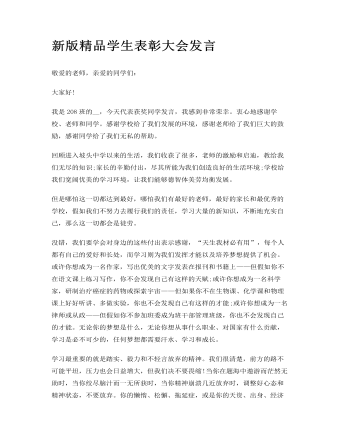
新版精品学生表彰大会发言
在这里,我也要和同学们说一说,我们来到学校的主要任务是读书、学习。我们为什么要读书、学习呢?以前我也不很清楚,现在,我知道了:读书是为了打好文化基础,提高自己的学习能力,掌握一定的本领,将来好为国家做出贡献,从而实现自己的人生价值。那么,怎样才能提高自己的学习成绩呢?我认为,首先要有勤奋学习的态度。只要你勤奋努力了,成绩就一定会慢慢提高,成绩提高了,你就会找到自信心,有了自信心,成绩就会提高的更快,到那时,你就会感到学习也是一件很快乐的事情。第二,要有正确的学习方法。我从一本书上看到一位清华大学的学生介绍的“三先三后”的学习方法,即先预习,后听课;先复习,后做作业;先独立思考,后请教别人。这种方法,我感到对我很有用。我就是这样学习的。我还听老师说过,一流高手做作业是看得懂,做得对,说得清。我现在正朝着这个方向努力着。第三、注意培养自己良好的学习习惯。主要有提前预习的习惯、专心听讲的习惯、及时改错的习惯、查找资料的习惯、勤于动笔的习惯、认真书写的习惯。
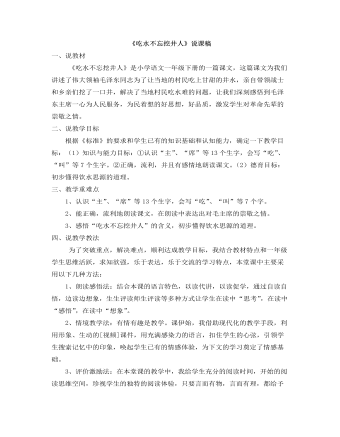
部编人教版一年级下册《吃水不忘挖井人》说课稿
一、说教材《吃水不忘挖井人》是小学语文一年级下册的一篇课文,这篇课文为我们讲述了伟大领袖毛泽东同志为了让当地的村民吃上甘甜的井水,亲自带领战士和乡亲们挖了一口井,解决了当地村民吃水难的问题,让我们深刻感悟到毛泽东主席一心为人民服务,为民着想的好思想,好品质,激发学生对革命先辈的崇敬之情。二、说教学目标根据《标准》的要求和学生已有的知识基础和认知能力,确定一下教学目标:(1)知识与能力目标:①认识“主”、“席”等13个生字,会写“吃”、“叫”等7个生字。②正确,流利,并且有感情地朗读课文。(2)德育目标:初步懂得饮水思源的道理。
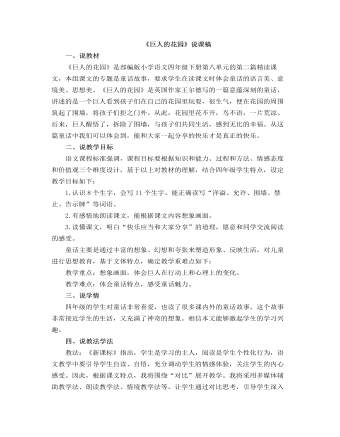
部编人教版四年级下册《 巨人的花园》说课稿
一、说教材《巨人的花园》是部编版小学语文四年级下册第八单元的第二篇精读课文,本组课文的专题是童话故事,要求学生在读课文时体会童话的语言美、意境美、思想美。《巨人的花园》是英国作家王尔德写的一篇意蕴深刻的童话,讲述的是一个巨人看到孩子们在自己的花园里玩耍,很生气,便在花园的周围筑起了围墙,将孩子们拒之门外。从此,花园里花不开,鸟不语,一片荒凉。后来,巨人醒悟了,拆除了围墙,与孩子们共同生活,感到无比的幸福。从这篇童话中我们可以体会到,能和大家一起分享的快乐才是真正的快乐。二、说教学目标语文课程标准强调,课程目标要根据知识和能力、过程和方法、情感态度和价值观三个维度设计,基于以上对教材的理解,结合四年级学生特点,设定教学目标如下:
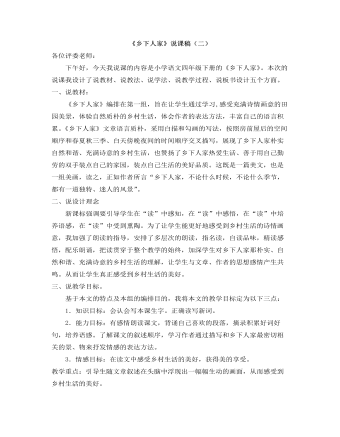
部编人教版四年级下册《乡下人家》说课稿(二)
(一)音画同步,创设情境感知文章结构,明确学习任务上课伊始,教师先出示乡下风光的多媒体课件,配乐旁白:这是顺着棚架爬上屋檐的碧绿藤蔓;这是依着时令次第开放的鲜花;这是茂密竹林中破土而出的春笋;这是觅食的鸡群戏水的小鸭。这里就是充满诗情画意的乡下人家。在作者的眼里乡下人家的画面是怎样的?学生借助第一课时感知的框架,加上画面的重现,在文字的引领下,下乡来了解这是什么样的“家”,是怎样的“人”。学生能在最短的时间内引发阅读期待,走进乡下人家。为深入感知理解课文内容,体会作者描写上独特的表达方式奠定了基础。(二)整合内容,教师导学细化理解方法,夯实学习实效教师引导学生整体感知后直奔中心:“独特、迷人”来统领全文教学,抓住文章第一自然段明确用“抓重点句、关键词”的方法品味风景“独特”在哪里,“迷人”在何处?这样激起了学生探究作者是怎样用文字生动形象地描述一幅幅画面的欲望。联系生活实际理解对比的描写方法并不难,抓住动词体会也很容易,但是透过文字提取情感,再联系落实到朗读感受就是需要教师具体操作,学生体验实践的最具实效的学习历程。
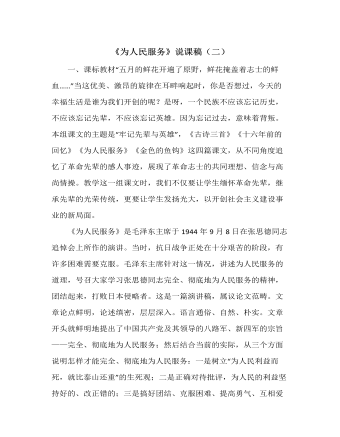
部编人教版六年级下册《为人民服务》说课稿(二)
二、教法学法(一)突出主体,选择教法:课堂是学习的场所,学生是学习的主人。《语文课程标准》明确指出:“积极倡导自主、合作、探究的学习方式”,要充分发挥学生的主体作用,全面提高学生的语文素养。基于以上的认识,我选择教法如下:1.以读为主,读思写结合法;2.引扶放相结合,意在引导学生注意议论文的特点与学习方法,从而培养学生自能读书的能力与习惯。(二)重在实践,指导学法:“语文是实践性很强的课程”,就是要让学生在大量的语文实践中掌握运用语文的规律与方法,也就是既要“授人以鱼”,更要“授人以渔。为此,我指导学生以读为本,体会文章论述方法、抓住重点词句进行理解课文。三、教学过程:(一)回忆旧知,导入新课1.上节课我们通过学习课文,你还记得课文中心论点是什么吗?哪个句子点明了这个观点?(指名答,板书:全心全意为人民服务)2.课文从哪些方面对这个观点展开叙述?(指名答,板书:死的意义、正确对待批评、团结人民)
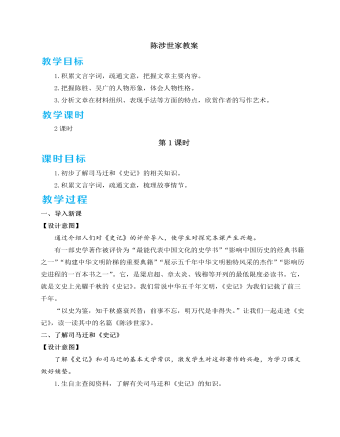
人教部编版语文九年级下册陈涉世家教案
1.王侯是一个地区的实际统治者,世代保有其国,对全国政局有一定的影响,故其传记称为“世家”。陈涉并非王侯,司马迁为什么把他归入“世家”?《史记》中人物传记分为三类,“本纪”记帝王,“世家”记王侯,“列传”记人臣,但这只是一个大略的划分,对于某些历史人物,作者有他特殊的考虑。陈涉就是一个特例。他出身低微,起义后虽自立为王,但为时仅六个月。之所以列入“世家”,是因为在秦王朝的严酷统治下首先发难,的确是非常之功。司马迁在这篇传记的最后写道:“陈胜虽已死,其所置遣侯王将相卒亡秦,由涉首事也。”可见司马迁看重的是功业,而不以成败论英雄。类似的例子有项羽,他并未统一称帝,但作者高度评价了他在反秦斗争中的领导作用,把他列入“本纪”。2.本文是长篇节选,在结构上具有怎样的特点?
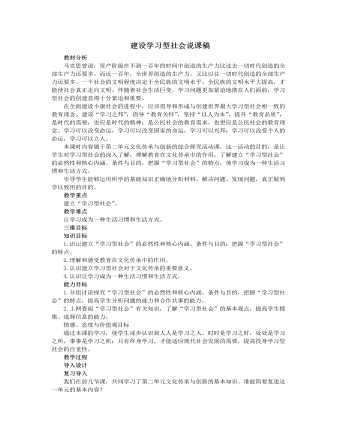
人教版高中政治必修3建设学习型社会说课稿
解析:材料是讲学习型社会所产生的影响,A项观点错误,在当前和今后相当长的时间里,学校教育仍然是人们获得知识的最重要的途径。B项观点错误,终身学习只是成就人生目的的手段、途径,而不是目的本身。D项说法错误,当前我国社会的中心工作是经济建设。二、问答题5.材料一:日本是公认的漫画大国,日本的动漫产业产值每年230万亿日元,成为日本的第二大支柱产业。在日本,漫画比电影、小说有时甚至比电视或音乐更受欢迎。日本漫画的热潮还席卷了世界:日本每年出口到美国的卡通片价值就达5 000亿日元,是日本对美国钢铁出口金额的4倍;漫画中的人物被迅速复制成电子游戏、卡通片及真人演出的节目。原来只是闲暇时候消遣的漫画,正飞速渗透到人们的生活中。值得警惕的是,除了催人奋进的精华之外,日本漫画中也存在暴力、色情、扭曲历史等诸多糟粕,对缺乏辨别能力的青少年产生了许多不良影响,更引发了一系列深刻的社会问题。

人教版高中政治必修4生活处处有哲学说课稿
(二)组织学生探究知识并形成新的知识。我从学生的生活体验入手,运用案例等形式创设情境呈现问题,使学生在自主探索、合作交流的过程中,发现问题、分析问题、解决问题,在问题的分析与解决中主动构建知识。主要通过几幅漫画让学生思考其中的哲学道理,开始接触哲学。漫画一:种瓜得瓜,种豆得豆,种鸡蛋得??漫画二:甲:下雨好极啦!乙:下雨糟透了!漫画三:——狂妄之徒,你竟然坏了祖上规矩!在引导学生思考、体验问题的过程中,可以使学生逐步学会分析、解决问题的方法。这样做既有利于发展学生的理解、分析、概括、想象等创新思维能力,又有利于学生表达、动手、协作等实践能力的提高,促进学生全面发展,力求实现教学过程与教学结果并重,知识与能力并重的目标。

人教版高中历史必修3辉煌灿烂的文学说课稿
教师:不同的时代造就了不同风格和不同精神内容的诗词,请同学们回顾必修一和必修二两宋中央集权的加强和经济的发展状况。学生:回忆回答。教师:请同学们结合时代背景和词的特点理解词为什么能够成为宋代文学的主流形式和标志?学生:两宋时经济重心转移到了南方,商业发展打破了时间和空间的限制,城市繁荣,市民数量不断增加。词的句子长短不齐,便于抒发感情,并且能够歌唱,更能适应市井生活的需要。于是,词成为宋代文学的主流形式和标志。教师:宋代文人地位提高,宋词就是一个个时代的画卷:大宋的悲欢离合都写在了里面。除了词之外,宋代民间还兴起了一种新的诗歌形式,即散曲。学生:回答散曲的发展阶段及特点、元曲的含义、特点。教师:在中国古代诗歌辉煌发展的同时,也产生了供人们闲来无事消遣的小说。
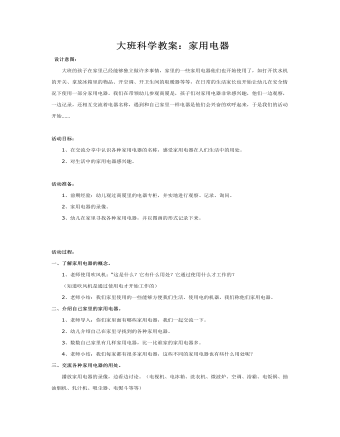
大班科学教案:家用电器
活动目标:1、在交流分享中认识各种家用电器的名称,感受家用电器在人们生活中的用处。2、对生活中的家用电器感兴趣。 活动准备:1、前期经验:幼儿观过商厦里的电器专柜,并实地进行观察、记录、询问。2、家用电器的录像。3、幼儿在家里寻找各种家用电器,并以图画的形式记录下来。 活动过程:一、了解家用电器的概念。1、老师使用吹风机:“这是什么?它有什么用处?它通过使用什么才工作的? (知道吹风机是通过使用电才开始工作的)2、老师小结:我们家里使用的一些能够方便我们生活、使用电的机器,我们称他们家用电器。二、介绍自己家里的家用电器。1、老师导入:你们家里面有哪些家用电器,我们一起交流一下。2、幼儿介绍自己在家里寻找到的各种家用电器。3、数数自己家里有几样家用电器,比一比谁家的家用电器多。4、老师小结:我们每家都有很多家用电器,这些不同的家用电器也有些什么用处呢?三、交流各种家用电器的用处。 播放家用电器的录像,边看边讨论。(电视机、电冰箱、洗衣机、微波炉、空调、浴霸、电饭锅、抽油烟机、轧汁机、吸尘器、电熨斗等等)1、这是什么?有什么用处?2、它们的形状、颜色一样吗?为什么要不一样?(满足人们不同的喜好)3、随机提问:你同意他的说法吗?还有什么意见?4、你们还有什么问题吗?可以提出来大家一起讨论?5、老师小结:家用电器用处可真大,它们给我们生活带来了方便。
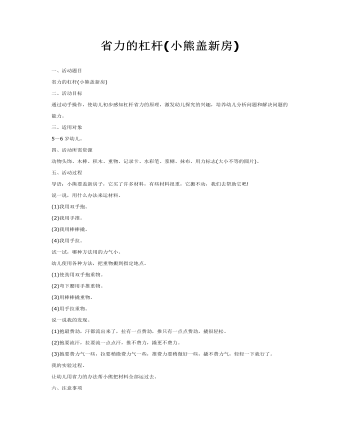
科学教案:小熊盖新房(省力的杠杆)
二、活动目标通过动手操作,使幼儿初步感知杠杆省力的原理,激发幼儿探究的兴趣,培养幼儿分析问题和解决问题的能力。三、适用对象5~6岁幼儿。四、活动所需资源动物头饰、木棒、积木、重物、记录卡、水彩笔、浆糊、抹布、用力标志(大小不等的圆片)。五、活动过程导语:小熊要盖新房子,它买了许多材料,有些材料很重,它搬不动,我们去帮助它吧!说一说,用什么办法来运材料。

人教版高中生物必修2人类遗传病说课稿
一、人类遗传病1.概念2.分类(1)单基因遗传病(2)多基因遗传病(3)染色体异常遗传病①原因②类型3遗传病的特点4.遗传病对人类的危害八、说布置作业在作业的布置中,我严格遵循“重质量、轻负担”的指导思想。第一题主要是为了帮助学生及时纠正原有的对知识的错误理解或片面认识,培养学生的解题技巧和技能。所以我选用了该题。同时想借助该题培养学生对问题的科学的思维方法和探究的精神。帮助学生提高对信息技术运用的熟练程度,发展学生的信息素养。附作业:1、连线题,请同学们连线指出下列遗传各属于何种类型?(1)苯丙酮尿病 A、单基因遗传病(2)21三体综合征(3)抗维生素D佝偻病 B、多基因遗传病(4)软骨发育不全(5)青少年型糖尿病 C、常染色体病2、以生物小组为单位进行人类遗传病的调查。
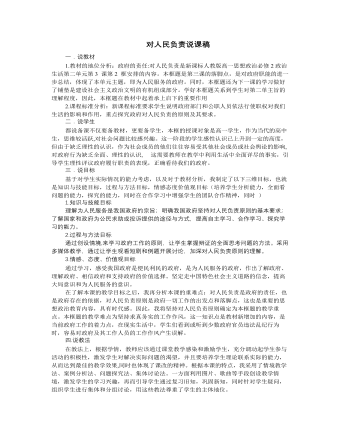
人教版高中政治必修2对人民负责说课稿
在学生活动的基础上,教师总结归纳:要坚持从群众中来到群众中去的工作方法。要求:政府要通过各种途径,利用各种群众组织、社会团体广泛收集群众意见和建议,认真对待群众的来信来访。还要为群众诚心诚意办实事,尽心竭力解难事,坚持不懈。通过合作探究,以此来培养学生的分析能力,探究能力以及透过现象看本质的能力,培养学生获取信息的能力,自主学习的能力以及全面看问题的能力,再结合教师的讲授,给学生一种茅塞顿开的感觉。环节四 回归生活 提升情感我将引导学生阅读课本,通过设置活动探究课,结合生活实际从时效,便利,实效等方面请学生评述公民求助或投诉的四种方式的特点和优点。在这一过程中,我还会用多媒体展示常用的热线电话,政府网站上有关信访、政务公开及其他便民利民的栏目,丰富课堂资源。让学生阅读课本,自行归纳知识点,有助于培养学生自主学习能力。


